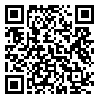Volume 13, Issue 1 (9-2025)
JRH 2025, 13(1): 0-0 |
Back to browse issues page
Download citation:
BibTeX | RIS | EndNote | Medlars | ProCite | Reference Manager | RefWorks
Send citation to:



BibTeX | RIS | EndNote | Medlars | ProCite | Reference Manager | RefWorks
Send citation to:
Yousefi M, Khani Jeihooni A, Khazir Z. Effect of Virtual Quranic Teachings on Perceived Stress, Anger Control, and Professional Ethics of Medical Students. JRH 2025; 13 (1)
URL: http://jrh.mazums.ac.ir/article-1-1221-en.html
URL: http://jrh.mazums.ac.ir/article-1-1221-en.html
Assistant Professor, Department of Public Health, Torbat Jam Faculty of Medical Sciences, Torbat Jam, Iran
Abstract: (41 Views)
Background and Purpose: The level of stress and its complications has increased in the lives of people to such an extent that it has caused concern for many institutions and organizations, including the World Health Organization. Some people are also plagued by uncontrolled anger, which has harmful consequences on the health of individuals, along with psychological disorders. Teaching the concepts and instructions of the Quran has a significant impact on reducing stress and controlling anger among students. The present study aimed to investigate the effect of virtual Quranic teaching on perceived stress, anger control, and professional ethics among medical students.
Materials and Methods: This experimental study was conducted on students of Shiraz University of Medical Sciences in 2023-2024. The sample size included 100 students (50 in the experimental group and 50 in the control group), and the samples were selected from all 10 medical schools of Shiraz, using a multi-stage sampling method. The data collection tool was a questionnaire on demographic characteristics, perceived stress, anger control, and professional ethics, which was completed virtually. To implement the educational intervention in the experimental group, a WhatsApp group was established, through which messages related to Quranic ethical concepts and anger control were sent to the participants. Data analysis was performed in SPSS software (version 27) using the Chi-square test, independent t-test, and paired t-test.
Results: The results showed that before the educational intervention, there was no significant difference between the test and control groups in terms of the mean score of perceived stress, anger, and professional ethics (P>0.05). However, three months after the educational intervention, the mean score of perceived stress and anger in the experimental group was significantly reduced, compared to the control group, and the mean score of professional ethics in the experimental group was significantly increased, compared to the control group (P<0.05).
Conclusion: Findings of this study indicate that teaching the instructions of the Quran is effective in reducing the stress and anger of students and increasing their professional ethics. Accordingly, it is recommended that the officials and trustees of cultural and health affairs of medical universities provide the conditions for holding Quran education courses for students.
Materials and Methods: This experimental study was conducted on students of Shiraz University of Medical Sciences in 2023-2024. The sample size included 100 students (50 in the experimental group and 50 in the control group), and the samples were selected from all 10 medical schools of Shiraz, using a multi-stage sampling method. The data collection tool was a questionnaire on demographic characteristics, perceived stress, anger control, and professional ethics, which was completed virtually. To implement the educational intervention in the experimental group, a WhatsApp group was established, through which messages related to Quranic ethical concepts and anger control were sent to the participants. Data analysis was performed in SPSS software (version 27) using the Chi-square test, independent t-test, and paired t-test.
Results: The results showed that before the educational intervention, there was no significant difference between the test and control groups in terms of the mean score of perceived stress, anger, and professional ethics (P>0.05). However, three months after the educational intervention, the mean score of perceived stress and anger in the experimental group was significantly reduced, compared to the control group, and the mean score of professional ethics in the experimental group was significantly increased, compared to the control group (P<0.05).
Conclusion: Findings of this study indicate that teaching the instructions of the Quran is effective in reducing the stress and anger of students and increasing their professional ethics. Accordingly, it is recommended that the officials and trustees of cultural and health affairs of medical universities provide the conditions for holding Quran education courses for students.
Type of Study: Original Research |
Subject:
Sciences of Quran & Hadith
Send email to the article author
| Rights and permissions | |
 |
This work is licensed under a Creative Commons Attribution-NonCommercial 4.0 International License. |





